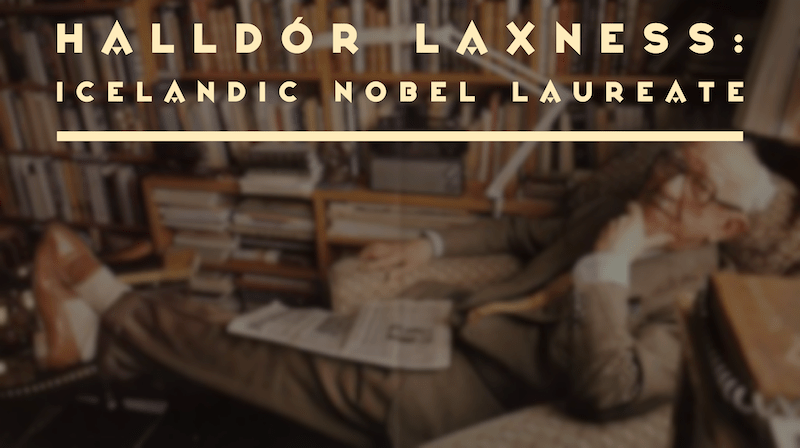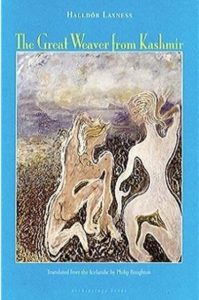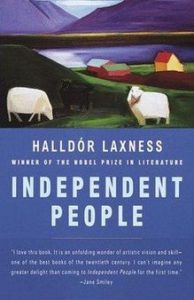

As I have mentioned in previous episodes, literature plays a big role in Icelandic society. Halldór’s nobel prize for his literature about Icelandic society is something that Icelandic people are very proud of.
He was born in Reykjavík in 1902 and his parents moved to the Laxnes farm near Mosfellsdalur when Halldór was three. His birth name was Halldór Guðjónsson but he changed it later on in life. In his own memoirs, he describes himself as an odd child. He learned to read and write at an early age, and spent a lot of time scribbling away in his notebook. From 1915 to 1916, he attended a technical school in Reykjavík and had his first article published in Morgunblaðið, a local newspaper, when he was 14 years old. By the age of 17, Halldór had already published his first book “Barn náttúrunnar”. He also had traveled abroad to other countries in Europe.
Laxness Converts to Catholicism
Surprisingly, he joined a Benedictine monastery in Luxembourg in 1922. Halldór was baptized and confirmed Catholic in 1923. After being confirmed, he took on the last name Laxness, after the farm that he grew up on in Reykjavík. He also took on the name Kiljan, which is the Icelandic version of the name Irish martyr Saint Killian.
In episode 29, which is right before this, I talk about Iceland’s unique and strict naming system. Very few people in Iceland have family names and Laxness is one of them.
During his stay at the monastery, Halldór read lots of books and studied French, Latin, theology and philosophy. He also joined a group in the monastery that prayed for the reversion of Nordic countries back to Catholicism. He wrote about his experiences during that time in the books Undir Helgahnúk and Vefarinn mikli frá Kasmir (The Great Weaver from Kashmir). The Icelandic critic Kristján Albertsson gave Halldór’s “The Great Weaver from Kashmir” a great review. He said the following about the novel that had been published in 1927,
“Finally, finally, a grand novel which towers like a cliff above the flatland of contemporary Icelandic poetry and fiction! Iceland has gained a new literary giant – it is our duty to celebrate the fact with joy!”
Kristján Albertsson
Socialism
Laxness lived in the United States from 1927 until 1929. During this time, he gave lectures on Iceland and even tried to write screenplays for Hollywood films. The most significant shift during his time in the U.S. is that he stopped being religious and became a socialist. He says that he,
“…did not become a socialist in America from studying manuals of socialism but from watching the starving unemployed in the parks.”
Halldór Laxness
His book Alþýðubókin or The Book of the People, which he published in 1929, was based on the fundamental ideas of socialism and Icelandic individuality. During that same year, Laxness found himself in hot water with the United States.. He published an article in Heimskringla, a Canadian newspaper, that criticized the United States. The U.S. was not amused and charges were filed against him. Laxness was detained and his passport was confiscated. Thankfully, the author Upton Sinclair and the law group ACLU came to his aid. They were able to get the charges dropped and Halldór was able to return to Iceland later that year.
The 1930’s
The shift in Halldór from the 1920s to the 1930s was quite drastic. He went from almost becoming a monk in the early 1920s to harshly attacking the Christian spiritualism of Einar Hjörleifsson Kvaran, an influential Icelandic writer who had been considered for the Nobel prize. It seems socialist ideas really resonated with the younger generations in Iceland and Laxness was at the forefront of expressing these principles at the time.
His novel Salka Valka, which was published in 1931, was the beginning of his sociological novels that he wrote over the next 20 years. The novels written and published during that time are considered the greatest period of his career. Most notably, Sjálfstætt fólk or Independent People was published in 1934 and has been heralded by some as being the best book of the twentieth century. It also was received with mixed feelings in Iceland. His depiction of rural Iceland was in opposition to the romantic idyll of rural life that many other novels depicted at the the time, especially since there was a conflict between urban and rural lifestyles in Iceland during this time period. This book had a huge impact on Icelandic culture.
However, some critics consider his four part novel Heimaljós or World Light, as his most important work. The novels are loosely based on 19th century Icelandic poet named Magnús Hjaltason Magnusson.
The 1940s
The 1940’s proved to be even better for Laxness, literary wise, than the 1930’s. Halldórs three part novel Íslandklukkan or Iceland’s Bell was published between 1943 and 1946. In a “History of of Icelandic Literature” which was edited by Daisy Neijmann, íslandklukkan is described as “probably the most significant (Icelandic) novel of the 1940s.” The Book of the Month Club in the United States featured Independent People as one of its selections for its readers in 1946. The book sold 450,000 copies. Two years later, Laxness built a house in Mosfellsdalur, which is a rural area right outside of Mosfellsbær.
During World War II, the U.S. set up a permanently military base in Keflavík. In response to that base, Laxness wrote Atómstöðin or Atom Station, a satire. The scholar Stefán Einarsson describes as Atom Station as a Laxness portraying ´”postwar society in Reykjavík, completely torn from its moorings by the avalanche of foreign gold.” Many people believe that this novel aided in him being blacklisted from the United States.
Winning the Nobel Prize & Other Awards
Laxness received the Lenin Peace Prize in 1952 and the Soviet-sponsored World Peace Council prize in 1953. for Nobel Prize for literature in
In 1955 Halldor Laxness received the Nobel Prize in Literature for… his vivid epic power, which has renewed the great narrative art of Iceland.
During his acceptance speech for the Nobel prize Halldór said,
“… the moral principles she [his grandmother] instilled in me: never to harm a living creature; throughout my life, to place the poor, the humble, the meek of this world above all others; never to forget those who were slighted or neglected or who had suffered injustice, because it was they who, above all others, deserved our love and respect…”
Haldór Laxness
Halldór Laxness Later in Life
In the 1960s, Laxness was heavily involved in Icelandic theatre. He wrote and produced many plays. His most successful was the Pigeon Banquet or Dúfnaveislan. He continued to write essays and memoirs into the 1970s and 80s. Later in life he suffered from Alzheimer’s disease and died at the age of 95 in a nursing home.
Regarding his personal life, Laxness was married twice and had four children. The home he built Gljúfrasteinn is now a museum operated by the Icelandic government.[43]
People can visit the museum and there are even concerts in the house during the summer.
Now that you have learned one of Iceland’s most famous authors and, currently, the only Nobel Laureate in the country, I am going to move on to the random fact about Iceland for this episode
Random fact of the episode
Halldór Laxness wrote more than 60 books in his lifetime. 22 of those are novels. I will have links to a few of his books in this episode. Some can be purchased on Amazon. Full disclosure, some of the links are affiliate links, which means I get a small commission if you buy the book via the link in the show notes for this episode.
Icelandic word of the day
Author – höfundur
Let’s be social!
Here is where you can connect with me on social media platforms:
I hope you enjoyed this episode that is chock full of information about the evolution of Icelandic food culture. I release a new podcast episode every week. Make sure you are subscribed to the All Things Iceland podcast so you don’t miss new episodes. If the platform you are listening to this podcast on allows you to leave a review, please do so.
Þakka þér kærlega fyrir að hlusta (og að lesa) og sjáumst fljótlega
Thank you kindly for listening (and reading) and see you soon!


